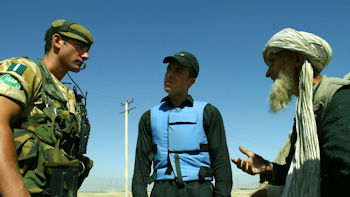Brokering war: Afghan interpreters, western soldiers and unequal encounters in crisis
Posted on 9 December 2024

In a new publication this week, Professor Sara de Jong delves into the complex and often overlooked relationships between Afghan interpreters and Western military personnel. Her article, Brokering War: Afghan Interpreters, Western Soldiers and Unequal Encounters in Crisis, published in Cultural Studies, sheds light on the deep inequalities embedded within these interactions.
The study highlights the dual role of Afghan interpreters as essential mediators during military operations and as vulnerable individuals often subjected to exploitation and abandonment post-conflict. Sara argues that interpreters operate in a precarious space, facing both personal and professional challenges due to power imbalances and a lack of institutional protections.
Abstract
Crisis scholarship has so far remained inattentive to the uneven entanglements and encounters that operate in what are designated as times or spaces of crisis, such as conflict and war. Indeed, scholarship on crisis suffers from a division between scholars who study the effect of crisis on privileged groups and locations and those who research marginalized communities. This has led the first to approach crisis as an exceptional moment, and the latter to argue that crisis is a semi-permanent condition. The lack of exchange between these two bodies of crisis scholarship has resulted in insufficient consideration of the divergent experiences of the nature and temporalities of crisis by unequally situated actors. This article looks at the contact zone forged by the 2001–2021 Afghanistan war to demonstrate that temporalities of crisis manifest themselves in varied and uneven ways, depending on the positionality of actors. Empirically, this article draws on interviews conducted with western Afghanistan veterans and with Afghan interpreters who worked as linguistic and cultural brokers. By contrasting the experiences of Afghan interpreters with that of the international soldiers who were dependent on their brokerage, I show how differential structures of power and privilege shape what constitutes a crisis, who is touched by it and how and when crisis makes itself felt. Close analysis of the narratives of Afghan interpreters also challenges scholarship which presents brokers as crisis opportunists, who subsequently experience an existential crisis and tragic demise (Distiller and Samuelson Citation2005, Gaskill Citation2023). Instead, I develop the argument that brokers’ relationship to crisis can be better understood when the relational and spatio-temporal frames to situate their actions are expanded. I suggest that the cliché of the tragic broker is unsettled when tracing the strategies of Afghan interpreters over time and with attention to the interactions with those for whom they broker.
